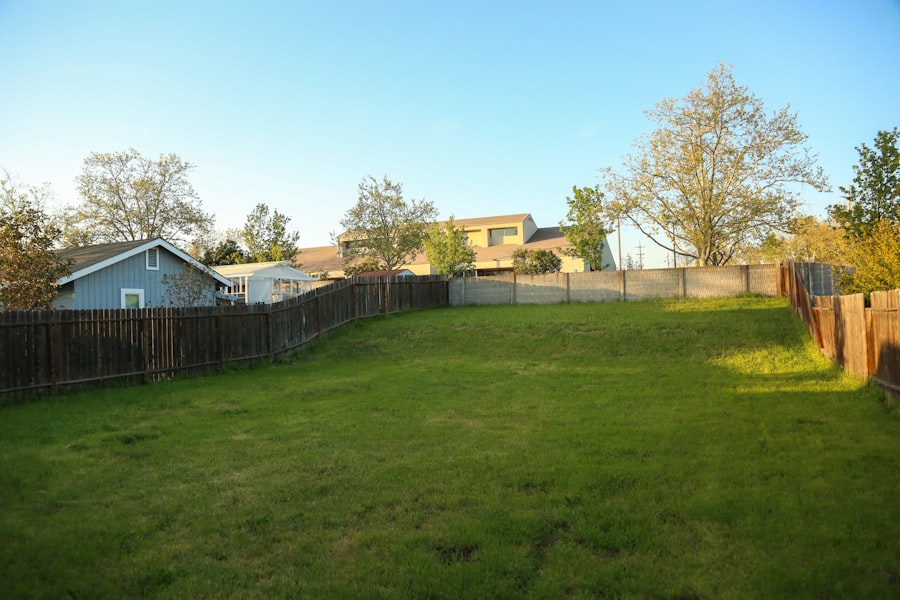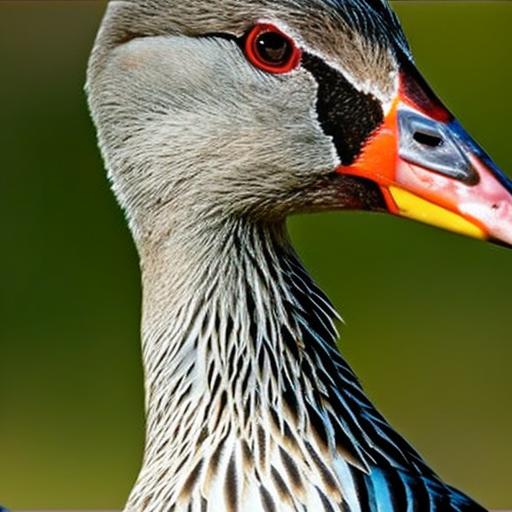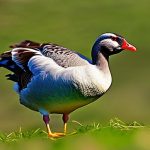Wild geese are a common sight in many areas, especially during migration seasons. While they may be beautiful to watch from a distance, having wild geese in your yard can cause a variety of problems. From damage to your landscaping and property to health risks associated with their droppings, it’s important to take steps to keep wild geese out of your yard.
Key Takeaways
- Wild geese can be a common sight in yards and can cause damage to property.
- Understanding the behavior of wild geese can help prevent them from entering your yard.
- Wild geese can negatively impact your yard by leaving droppings and damaging plants.
- Physical barriers, such as fencing and netting, can be effective in keeping wild geese out of your yard.
- Landscaping can also play a role in controlling wild geese by removing food sources and creating an uninviting environment.
Understanding the Behavior of Wild Geese
Geese are attracted to certain areas for a variety of reasons. They are social animals and tend to gather in large groups, known as flocks. These flocks are often attracted to areas with open water, such as ponds or lakes, where they can find food and rest. Geese also communicate with each other through vocalizations and body language. They use honking sounds to communicate danger or to signal their presence to other geese.
The Negative Impact of Wild Geese on Your Yard
Having wild geese in your yard can cause significant damage to your landscaping and property. Geese are herbivores and will graze on grass, plants, and crops. This can result in bare patches in your lawn and damage to flower beds and vegetable gardens. In addition, their droppings can be unsightly and pose health risks. Goose droppings can contain bacteria such as E. coli and Salmonella, which can contaminate water sources and cause illness in humans and pets.
Tips for Preventing Wild Geese from Entering Your Yard
There are several steps you can take to prevent wild geese from entering your yard. First, it’s important to keep your yard clean and free of food sources that may attract geese. This includes removing fallen fruit from trees, securing garbage cans, and not feeding birds or other wildlife in your yard. Additionally, removing standing water can help deter geese, as they are attracted to areas with water for drinking and bathing. Finally, installing fencing or netting around your yard can create a physical barrier that prevents geese from entering.
Using Physical Barriers to Keep Wild Geese Out
There are several types of physical barriers that can be used to keep wild geese out of your yard. One option is to install a fence around your property. This can be effective in preventing geese from entering, but it may also block other wildlife or create an unsightly barrier. Another option is to use netting to cover areas where geese may be attracted, such as ponds or gardens. This can prevent geese from accessing these areas while still allowing other wildlife to pass through.
The Importance of Landscaping in Wild Goose Control

Certain plants and landscaping features can deter geese from entering your yard. Geese prefer open spaces where they have a clear line of sight, so planting tall grasses or shrubs can make your yard less attractive to them. Additionally, using plants that geese do not like to eat, such as prickly or thorny varieties, can help deter them from grazing on your landscaping. Creating barriers with rocks or other obstacles can also discourage geese from entering certain areas.
Repellents and Deterrents for Wild Geese
There are a variety of repellents and deterrents available that can help keep wild geese out of your yard. Chemical repellents, such as goose repellent sprays, can be applied to areas where geese are likely to gather. These sprays contain ingredients that are unpleasant to geese and will deter them from staying in the area. Sound and light deterrents can also be effective in scaring away geese. Devices that emit loud noises or flashing lights can startle geese and encourage them to leave.
Scaring Techniques to Keep Wild Geese Away
Scaring techniques can be used to keep wild geese away from your yard. One method is to use decoys, such as plastic owls or coyotes, to create the illusion of a predator in the area. Geese are naturally wary of predators and will avoid areas where they believe there is a threat. Another option is to use loud noises, such as banging pots and pans or using air horns, to startle geese and encourage them to leave. Other scare tactics include using reflective tape or flags that move in the wind, as geese are often frightened by sudden movements.
How to Deal with Wild Geese Already in Your Yard
If you already have wild geese in your yard, it’s important to remove them safely and humanely. It is illegal to harm or kill wild geese without a permit, so it’s important to use non-lethal methods. One option is to hire a professional wildlife removal service that specializes in goose control. They can safely capture and relocate the geese to a more suitable habitat. Another option is to use harassment techniques, such as loud noises or water sprays, to encourage the geese to leave on their own.
Maintaining a Goose-Free Yard
In conclusion, keeping wild geese out of your yard is important for both the health of your landscaping and the safety of your family and pets. By understanding the behavior of wild geese and implementing preventative measures, you can create a goose-free yard. From keeping your yard clean and free of food sources to using physical barriers and deterrents, there are many strategies you can employ. Remember to always remove geese from your yard safely and humanely, and take action to prevent them from returning. With these tips and strategies, you can maintain a beautiful and goose-free yard.
If you’re looking for ways to keep wild geese out of your yard, you might also be interested in learning how to create a safe and secure space for your chickens. Poultry Wizard offers a variety of helpful resources, including an article on renting a chicken coop (source). By providing your chickens with a designated area, you can not only protect them from predators but also minimize the risk of attracting wild geese to your property. Additionally, Poultry Wizard provides valuable information on chicken coop run plans (source) and transforming a shed into a chicken coop (source). These resources will help you create a safe haven for your feathered friends while keeping unwanted visitors at bay.
FAQs
What are some common problems caused by wild geese in yards?
Wild geese can cause damage to lawns, gardens, and landscaping by eating plants and grass, leaving behind droppings that can be difficult to clean up, and creating noise and disturbance.
What are some effective ways to keep wild geese out of your yard?
Some effective ways to keep wild geese out of your yard include using physical barriers such as fences or netting, using decoys or scare tactics such as loud noises or motion-activated sprinklers, and removing any sources of food or water that may attract them.
Is it legal to harm or kill wild geese?
In most cases, it is illegal to harm or kill wild geese without a permit. It is important to check with local wildlife authorities to determine the specific regulations in your area.
What should I do if I encounter an injured or sick wild goose in my yard?
If you encounter an injured or sick wild goose in your yard, it is important to contact a local wildlife rehabilitation center or animal control agency for assistance. Attempting to handle or care for the goose on your own can be dangerous and may further harm the animal.
Are there any natural deterrents that can be used to keep wild geese out of yards?
Some natural deterrents that can be used to keep wild geese out of yards include planting certain types of vegetation that geese do not like, such as prickly or thorny plants, and using natural predators such as dogs or hawks to scare them away. However, these methods may not be as effective as physical barriers or scare tactics.
Meet Walter, the feathered-friend fanatic of Florida! Nestled in the sunshine state, Walter struts through life with his feathered companions, clucking his way to happiness. With a coop that’s fancier than a five-star hotel, he’s the Don Juan of the chicken world. When he’s not teaching his hens to do the cha-cha, you’ll find him in a heated debate with his prized rooster, Sir Clucks-a-Lot. Walter’s poultry passion is no yolk; he’s the sunny-side-up guy you never knew you needed in your flock of friends!







